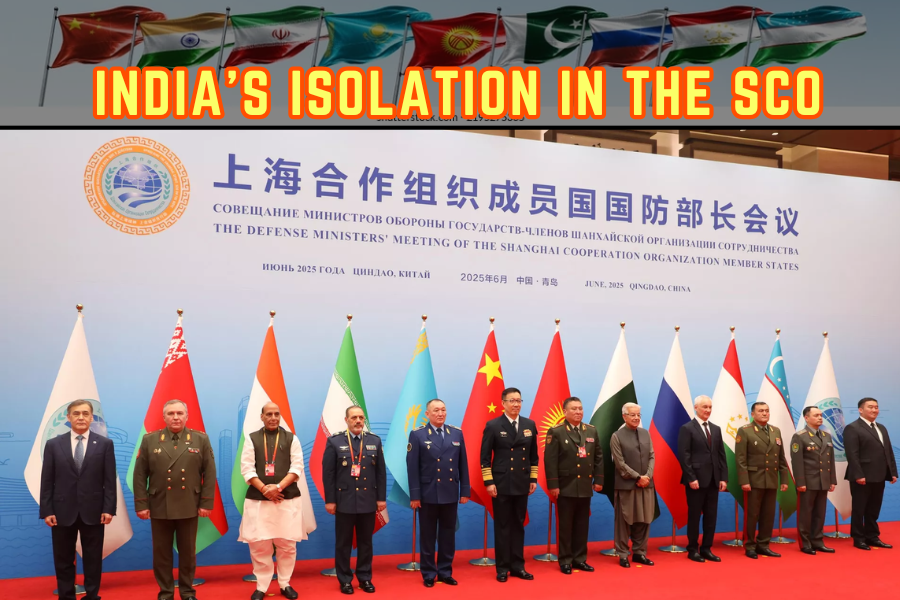(By Khalid Masood)
In June 2025, at the Shanghai Cooperation Organisation (SCO) Defence Ministers’ Meeting in Qingdao, China, India’s Defence Minister Rajnath Singh delivered a fiery speech, accusing unnamed states of sponsoring terrorism, a thinly veiled jab at Pakistan. Expecting applause, India instead met a wall of silence. The SCO’s refusal to endorse a joint statement that echoed India’s narrative—particularly its demand to link the April 2025 Pahalgam attack to Pakistan—left New Delhi isolated, as members like China, Russia, and Iran prioritized unity over division. The episode, reported by AP News and The Washington Post, underscores a broader truth: India’s relentless anti-Pakistan rhetoric has no traction in the SCO, a Eurasian bloc representing 42% of the world’s population and 36% of its GDP (PPP). This diplomatic rebuff exposes India’s miscalculations and highlights Pakistan’s maturing role in a forum that values cooperation over confrontation. This article explores why India’s propaganda falters, how Pakistan capitalizes on the SCO’s ethos, and the strategic lessons for Islamabad to cement its regional stature.
I. A Stage Where India Stumbled
The SCO, established in 2001 by China, Russia, and Central Asian states, is a colossus of Eurasian cooperation, spanning security, trade, and connectivity. With India and Pakistan joining in 2017, Iran in 2023, and Belarus in 2024, it covers 65% of Eurasia’s landmass and wields significant geopolitical clout. Yet, India’s persistent attempts to weaponize the SCO against Pakistan—pushing narratives of terrorism and Kashmir—have backfired spectacularly. At the 2025 Qingdao summit, India’s refusal to sign a joint communique, citing its pro-Pakistan bias for omitting the Pahalgam attack, drew no sympathy. Social media posts claim that “all countries supported Pakistan,” reflect a sentiment of India’s diplomatic defeat. This article argues that India’s isolation stems from its misreading of the SCO’s multipolar ethos, while Pakistan’s restrained diplomacy amplifies its regional influence.
II. India’s Entry into the SCO: Ambitions and Missteps
India joined the SCO in 2017 alongside Pakistan, driven by three motives: countering China’s Belt and Road Initiative (BRI), containing Pakistan’s regional influence, and burnishing its global image as a rising power. New Delhi saw the SCO as a platform to project its anti-terrorism stance, hoping to isolate Pakistan over alleged cross-border militancy. However, this was a strategic miscalculation. The SCO, rooted in the Shanghai Five’s 1996 framework, prioritizes sovereignty, non-interference, and Eurasian unity, not Western-aligned anti-terror crusades. India’s assumption that the SCO could be a stage to vilify Pakistan ignored its anti-hegemonic tilt, as noted by Britannica, which highlights the SCO’s aim to counter Western dominance. By 2025, India’s aggressive posturing had alienated even potential allies, exposing its disconnect with the SCO’s core principles.
III. India’s Misuse of the SCO Platform
India has consistently dragged bilateral grievances into the SCO’s multilateral arena, undermining its cooperative spirit. At the 2023 SCO summit hosted virtually by India, External Affairs Minister S. Jaishankar sparred with Pakistan’s Bilawal Bhutto Zardari over Kashmir, overshadowing regional agendas, per Al Jazeera. In 2025, Rajnath Singh’s Qingdao speech, slamming “countries that use cross-border terrorism as policy,” was a clear shot at Pakistan, linked to the April 2025 Pahalgam attack that killed 26, mostly Indian tourists. India’s Operation Sindoor, launched in May 2025 to target alleged terrorist infrastructure, was touted as a response. Yet, the SCO’s response was deafening silence. Members refused to endorse India’s narrative, rejecting its push to name Pakistan in the joint statement. Instead, the communique referenced terrorism in Balochistan, a nod to Pakistan’s concerns about Indian-sponsored destabilization. India’s melodramatic exit—refusing to sign the statement—only deepened its isolation, as reported by Euronews.
IV. Why the SCO Rejects India’s Narrative
The SCO’s refusal to echo India’s anti-Pakistan rhetoric stems from the strategic priorities of its key members, who value regional stability over New Delhi’s bilateral feuds.
a. China’s Leadership and Pakistan’s Strategic Weight
China, the SCO’s de facto leader, has deepened its strategic partnership with Pakistan through the $62 billion China–Pakistan Economic Corridor (CPEC), a BRI flagship. Beijing’s $1.5 billion annual trade with Pakistan and joint defence projects, like the JF-17 Thunder, ensure it vetoes anti-Pakistan narratives to maintain SCO unity. At Qingdao, China’s Defence Minister Dong Jun ignored India’s accusations, focusing on energy and trade cooperation, per AP News. Beijing’s rejection of India’s stance aligns with its broader goal of a multipolar order, sidelining New Delhi’s Western-leaning agenda.
b. Russia’s Balancing Act
Russia, a co-founder, values Pakistan’s counterterrorism role in Afghanistan and its energy cooperation, including a $1 billion gas pipeline deal in 2024, per TASS. Moscow’s refusal to back India’s Pahalgam narrative reflects its need to maintain ties with Islamabad, especially amid Western sanctions over Ukraine. At the 2024 SCO summit, Russia’s Prime Minister praised Pakistan’s hosting, signaling diplomatic warmth, per USIP. Russia’s neutrality in India–Pakistan disputes ensure the SCO remains a platform for cooperation, not confrontation.
c. Central Asian Republics’ Pragmatism
Kazakhstan, Uzbekistan, Tajikistan, and Kyrgyzstan prioritize connectivity and trade, leveraging Pakistan’s Gwadar port for Arabian Sea access. The Central Asia–China Gas Pipeline and the planned China–Kyrgyzstan–Uzbekistan railway, per Britannica, underscore their focus on economic integration. India’s fixation on terrorism, divorced from these priorities, finds no echo. At Qingdao, these states endorsed Balochistan’s inclusion in the communique, aligning with Pakistan’s concerns.
d. Iran’s Disillusionment with India
Iran, a 2023 SCO member, has soured on India due to its pro-Israel tilt and betrayal at international forums, like voting against Iran at the IAEA in 2023, per The Hindu. Tehran’s expulsion of Indian diplomats after uncovering espionage in Chabahar in June 2025, per Press TV, cemented its refusal to back India’s anti-Pakistan rhetoric. Iran’s Defence Minister Aziz Nasirzadeh supported the SCO’s balanced stance, prioritizing regional stability.
V. Pakistan’s Diplomatic Ascendancy
Pakistan’s approach in the SCO contrasts sharply with India’s. At the 2024 Islamabad summit, Pakistan hosted 900 delegates, including India’s Jaishankar, projecting itself as a regional player, per South Asian Voices. Prime Minister Shehbaz Sharif emphasized trade, connectivity, and climate resilience, aligning with SCO priorities like the Green Belt Program, per Pakistan’s Ministry of Foreign Affairs. Pakistan’s focus on AI-based security and counterterrorism via the Regional Anti-Terrorist Structure (RATS), which foiled 600 terror plots since 2017, per The Diplomat, earned praise. Mian stream and social media, hailed Pakistan’s diplomatic win at Qingdao, where its evidence of Indian interference in Balochistan swayed members, unlike India’s unproven Pahalgam claims. Pakistan’s restraint—avoiding bilateral jabs—has elevated its stature, while India’s theatrics falter.
VI. India’s Strategic Backfire
India’s isolation in the SCO is stark. Even Russia, once a close partner, distanced itself at Qingdao, prioritizing SCO unity, per The Nation. India’s alignment with Western frameworks like the Quad and I2U2 clashes with the SCO’s anti-hegemonic ethos, as noted by Carnegie Endowment. New Delhi’s refusal to endorse the BRI, unlike all other SCO members, further alienates it, per The Wire. The Qingdao debacle, where India stood alone, mirrors its waning regional clout, with social media posts resonating India’s “growing diplomatic irrelevance.” Conversely, Pakistan’s stature grows, leveraging CPEC and RATS to align with China, Russia, and Central Asia.
VII. Lessons for Pakistan
Pakistan must capitalize on India’s missteps with strategic finesse:
- Principled Diplomacy: Maintain a non-reactive stance, focusing on SCO priorities like trade and security, as demonstrated at the 2024 summit.
- Strengthen Alliances: Deepen ties with China via CPEC, Russia through energy deals, and Central Asia via Gwadar, ensuring economic and strategic leverage.
- Counter-Narrative: Use SCO platforms to expose Indian destabilization in Balochistan, backed by evidence, as seen in Qingdao’s communique.
- Innovative Security: Promote AI-based border security and RATS cooperation to bolster Pakistan’s counterterrorism credentials, per USIP.
VIII. Conclusion: A Bloc That Rejects Division
India’s attempt to malign Pakistan in the SCO has collapsed under the weight of its own miscalculations. The bloc, driven by China and Russia’s multipolar vision, has no appetite for New Delhi’s propaganda, as evidenced by the 2025 Qingdao summit’s rejection of India’s narrative. Pakistan, with its focus on connectivity, counterterrorism, and restraint, has emerged as a credible player, winning diplomatic victories where India falters. India’s “cry wolf strategy” has led to its isolation, while Pakistan’s evidence-based approach resonates. For Islamabad, the SCO is a stage to project strength and wisdom, countering India’s rhetoric with resolve. By playing the long game—rooted in cooperation and sovereignty—Pakistan can cement its role as a linchpin of Eurasian stability, leaving India’s divisive tactics in the dust.








I got what you mean , regards for posting.